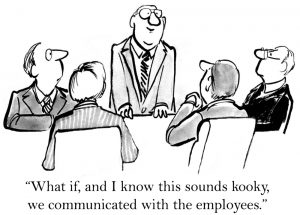IQ and EQ – intelligence and emotional intelligence – much has been written about these cognitive skills, but when disaster hits, leaders will know just how much of it both they and their employees have. However, it is the power of emotional intelligence including self-control, adaptability, confidence, initiative, and optimism that will determine the future whenever any business faces a challenge.
Anne* was hired to be the new GM for a manufacturer with in-demand medical products sold around the world. The morning she was to start, a 4 a.m. phone call informed her that the plant had suffered a devastating fire during the night. Within 24-hours, the President had assembled all employees, informed everyone that work would continue, but that it would be all hands on deck to help put the company back together again. Salvage operations, including cleaning equipment that had survived the fire, contacting customers, revising delivery dates, finding a new location and moving, kept employee teams busy and looking forward to the new future laid out by their leader. Within three weeks, no employees had quit, and the business was back up and running with minimal disruption. The key? A positive, optimistic, but realistic vision by the President, followed by active leader participation working with the teams. For the new GM, a few lessons stood out:
Teaming is often the way to go when tackling the difficult task of restructuring after a disaster. It is not uncommon to discover that there are many natural leaders among your employees. However, select only team leaders whose positivity and resilience can support new strategic decisions and help drive change with commitment. Low EQ leaders who complain, criticize, meltdown, or magnify the problems, may create dissonance that undermines momentum. At critical moments, there is time for feedback, but not argument. As the company steers away from the crisis, team leaders should be open and adaptive to the new direction, reinforcing the vision of the desired outcome to followers. Later, company leaders can return to a more democratic style.
Secondly, leaders should not ignore undercurrents of dissent. Identifying negativity head-on will help put a stop to attitudinal forces that act as stuck brakes on a racecar, and pockets of resistance will only grow into a bigger problem by avoiding confrontation. Take command; re-clarify the vision and the tasks, while avoiding a threatening tone. If possible, provide a target to the finish line. Next, ascertain whether employees are getting enough real-time information on the crisis. Fear generates dissent. Keep your employees informed and updated, especially about how their efforts are helping to solve the crisis. Check for stress, and calm your employees by letting them know that while there are important challenges ahead, these will be overcome by hard work, resilience, and determination. Share success stories and above all, encouragement. Celebrate when the crisis is over.
The short amount of time and hard work necessary to clean up after the fire happened because of actively committed and engaged employees. However, it wasn’t brilliant intellect that was responsible, but grit and the power of EQ-based leadership: self-control, adaptability, confidence, initiative, and most of all, optimism that fostered adaptation for change and the continued success of the business.
For additional reading:
Books on Emotional Intelligence by Daniel Goleman
Goleman, D. (2011, August 18). Daniel Goleman: ‘Leaders Must Position Their Employees Somewhere between Boredom and Stress.’ Knowledge at Wharton. Retrieved August 15, 2017 from http://knowledge.wharton.upenn.edu/article/daniel-goleman-leaders-must-position-their-employees-somewhere-between-boredom-and-stress/




